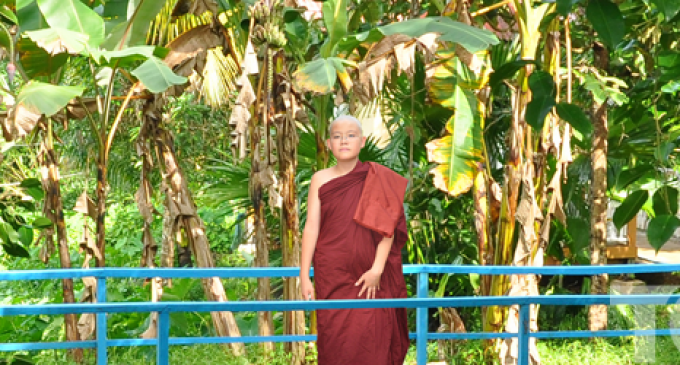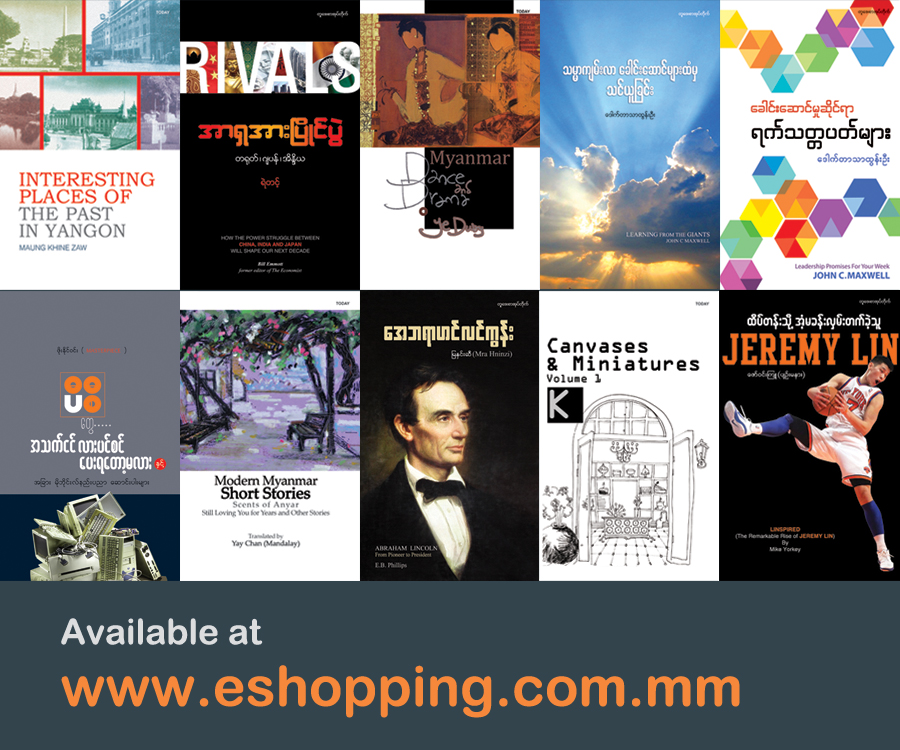The five days that changed my life

Being a Buddhist novice (a monk under the age of 20) is an extraordinary experience. You get an exhilarating feeling of peacefulness and contentment. Everyone is nervous on his first day, right? I was feeling the same nervousness
everyone gets on his first day before it even was starting. Here I was, bald and a to-beonvice, fidgeting as I climbed the stairs to my doom (or so I thought. My father was also with me, looking every bit as nervous as I was.) Monks, sacred sayadaws, were waiting. We had to recite numerous prayers, and don our robes. My father had to go through an extremely long ceremony that I thought took 30 hours not 30 minutes. My dad’s team, my relatives and my mother were waiting. After all the gifts and pictures, I was given a name that would last while I kept these blood-red robes on. Aggha Zaya became my name.
My father and mother were not my parents anymore. I had become a son of Buddha, and that would be the ultimate donation for my parents. My mother would not leave this monastery in the forest of Bago, for she had become a yogi, a more easygoing practitioner. Yogis didn’t have to crop their hair, and could sit on a chair while they ate. In many ways, they were closer to the real life of everyday peoples than their fellow monks. They were of lower rank than all the monks and novices. I’m
guessing they became yogis because they would leave the monastery when they have had enough of practicing the teachings of Buddha.
My ex-father (let’s just keep calling him father) and I had no duties that evening, so I read a book and went to sleep to the song of crickets and the bleating of tokay geckoes the second-largest gecko in the world. Soon, the croaking of frogs and the chirping of smaller geckoes joined the din. I have to say that I slept fitfully that night, not knowing what lay ahead.
I woke up late the next morning, at 5:30 AM. The other monks had been up since 3, and we had missed the pre-dawn meditation. My father and I rushed to the dining hall to catch a late breakfast. There, I saw my mother, looking very nervous, but still as bossy as ever.
That day was the most boring and painful day of my life. After breakfast, starting at about 6:30 AM, there was nothing to do but meditate. Oh, you might think “Painful? What painful? How bad can lounging around hurt you?” If you thought that, you are totally wrong. Sitting criss-cross was not easy. AT ALL. Come on, try sitting by crossing your legs for 15 minutes. Not easy. The aching was only half of the
problem. Trying to control your mind is not easy, let alone harness it to do good. An itching here, a pain there. It is SO hard to ignore these distractions if you can’t do anything about it. Can you focus on the rising and falling of your abdomen? For five minutes? Your mind always wanders off.
Anyway, after THAT set of torture, the monks, novices, nuns and yogis ate lunch. For these people, there is no such thing as dinner. Sad. After that, more meditation. A short break at five, meditation again at six. Well, that continued for two days.
I just could not focus upon meditation. It was torture. Finally, on the evening of the second day, relief (sort of) came. A sayadaw offered to teach me for as long as I stayed. At six, someother novices (permanentresidents) and I said someprayers and meditated. I did not know most of the prayers they were saying, and my legs burned after a mere 15 minutes of meditation.
Then, the sayadaw taught me some little poems. Then, we called the dogs (bodyguardsa gainsts nakes, etc.) and headed to my room. I played with the dogs as I waited for my father.
Finally, I collapsed into a tired heap and dropped of instantly.
I felt awesome. Now that most of the meditation was gone ( just 20 minutes here and there) I felt way better. You know, memorizing poems is better than meditation. But in the morning, before dawn, I had to go to the meditation hall to meditate. Then, I could finally go to my private teacher to learn new, more or less annoying poems.
The third day was the most horrible day as a novice. I had come up with a case of pains in my right eye, a pain that occurred every week or so. Think about having a knife stabbing your eye. That’s the pain I have to endure. I rested early, and managed to fall dead asleep. But before I got my ache, I went and begged for food at the almsround at six in the morning. I’ll talk about it in the next story.
On the fourth day, I felt alright. The usual routine continued. Wake up at 3, meditate from 4 to 5, eat breakfast. After that, go to the almsround then my teacher to learn more poems. Poems, poems, poems. What son with that monk? It boggles my mind.
After that, I get a short break, then go to eat lunch. Then, more of a break, then, my teacher teaches me. More poems. Then, a short break, then go to chat some not so- understandable prayers (its hard being new) and then meditate. Then, you know what comes next. By 8:30, I’m rarin’ to go home and be dead to the world. So I go with my teacher to my compound. On the way, we point my teacher’s flashlight at his house. I can spot a young tokay gecko or two. They are these gigantic, ugly, alien geckos that hake a sound like the baaa of a sheep or a tok-tek sound that lowers and lowers in pitch. Really annoying when you’re trying to sleep or meditate. Anyway, we take at least two monastery dogs to accompany us. Hey, I don’t know why there are so many Nepalese monks here, but the dogs (Mr. Yellow, Mr. Brown, Mr. Spot, and Mrs; Spot) love them to bits. In fact, they love everyone. The only downside is that they will HOUND you if you try to eat something near them. They go nuts. They will jump on you if you have some food in your hand. You can’t run from ‘em.
The fifth and last day was SOOO boring. Same old routine, then I get to be a human again! Then, we all sleep over at our “farm”. Hey, they don’t have any paddy fields. Not exactly a farm. But think on the bright side. They got a cat, a pig, two little ducklings, and a whole flock of chickens. Plus, you can’t beat the scenery.
OK, so you’re thinking: all right, what’s so good about being his novice? Well, I’ll tell you why. You finally realize that the pain you go through meditating or doing anything else is nothing. After all, you are going to die. Is there any more pain greater than dying? Negative. Most people cannot even use their minds, let alone control it. The mind is nothing. But most people cannot control it. A novice meditates right? Meditation lets you first, control the mind, taking away the wants of life. You won’t want to eat, sleep, rest, etc. if you don’t have to. Wants are things that you don’t need. Meditation cures this. If you meditate evenmore, you can even harness your elusive mind to do good.
Meditating also gives you the lesson of sending love to all living things. In Buddhist terminology, this gives you good merit. Good merit will get you to heaven or even eternal peace. Ya’ see, heaven is only temporary. You become an angel for a few hundred thousand years, then whatever good or bad merit you have also earned will decide your fate in your next life. Scary, huh? The only way to rest is to gain EEETTTEEERRRNNNAAALLL PPPEEEAAACCCEEE.
If your mind is controlled, everything is possible. Being a buddhist monk gives you this calmness that lets you consider everything you do. Well, all of this comes over time. Over my five days as a novice, I didn’t learn too much, but I can say that I got a bit calmer, but still as deliberate. Hey, at leastI improved!
The Almsround
This experience was one of the most painful yet best things that happened to me. That fateful third day, I was extremely nervous. It would be my first time participating in the almsround, twenty or so monks and novices who begged for rice at the local town. I was horrified when I had to take off my precious sandalsand let my tender feet go bare. I was loaded into an Isuzu Elf250 with the rest of the monks and novices. This truck would take us out of the monastery grounds (125 acres) and into the local town, a ride of about 10-15m inutes. I passed my farm and the Shwe Pyi Resort. Bumpy ride. I had one sore behind as I clumsily staggered off of the truck.
When we were dropped off, I ended being near the front, since I was one of the shortest. As we started to walk at a brisk pace, it was torture. Sharp pebbles poked my feet. Rough concrete made me stagger. That carried on for about a mile. Generous donors gave all the monks and novices a whole almsbowl of steaming rice. Then, it was all thrown into a large pot.
The worst of the trip was about to begin.
They called it the forest road. I could see why. The first leg consisted of a few hundred meters. The road was of crushed sandstone, which was sharp and hard. I thought of the red in the sandstone as my own blood. That’s how much it hurt. Later, I made up this saying: go until you want to drop and a hundred more steps. I lagged behind, my formally tied robes and my almsbowl were seriously slowing me down. Of course, the hardened novices could do this, for they had done this countless times before.
Finally, relief came. The rocks changed into smooth sand. The going was easy, and I could observe all that was around me. A lot of nature had remained untouched. Still, exotic bids called, and roosters, silver hinged beauties, crowed from every house. I loved that. Finally, the road ended and it was trekking on concrete again It was hard, because it was more in the outskirts and the poor section of the town. Finally, it was finished. I had a weird feeling. Despite all this pain, I was dying to go again. And so it happened. From day 3-5, I learned how to stay strong and ignore the pain that ran like a river through my soles.
I was amazed at what I saw at the almsround. I was flabbergasted to see whole lines of people spooning out rice to all the monks and novices. They were all poor, but somehow managed to have the time and money to cook up this rice and donate it. That’s why I was careful to always never leave a grain of rice left when I ate lunch at the monastery.
People have compassion, especially those who lead a simple life. I can’t wonder why all people can’t be like them. Old women hobble up to us and donate spoonfuls of rice, made from pure compassion and love. Villagers muster what rice they have to donate to the monks. I feel very grateful to them, for sacrificing what little things they have for doing good.
The almsround lasted 3 days for me. I became better and better at observing what was happening to me. The first time I went on the almsround, I was in a daze, blinded by excruciating pain. On the second and third time at the almsround, I became more and more alert.
Everyone loved the monks, and gave them all they could muster. People dirtpoor, living in tiny huts, had the compassion to give the monks a bowl of rice. I respected these people. I wondered if the way you live has anything to do with your generosity. I figured that people who were poor were way more generous than rich people. A poor person feels happy about his life, and does not feel selfish about his belongings. A rich person feels very protective of his belongings, and is blinded by greed to have more and more. Therefore, he is selfish, and feels ticklish about parting from his money.
I learned many valuable lessons on these excursion.I learned; to be strong and ignorepain, because death awaits, and there is no more pain more excruciating than that. The vast array of wildlife also made me more observant of my surroundings. The generosity of people taught me to be humble and grateful. I could talk about this for hours, but here are the three major things that are extremely important in life. For example, an anteater has to be able to withstand pain when something tries to hurt it. It has to be observant to not let predators come near it. When it attacks a termite mound, it is always grateful for what energy these termites have given it and never destroys a termite mound or eats too many termites.
With these lessons, I think that I am ready for life. I still have to make these lessons be put to use more effectively. If I do, I will be a prospering young man and might even make the world a better, tranquil place of harmony and peace.
Oung Kant
./wp-content/uploads/2018/10/Emirate-Online-TDY.png)

















There are no comments at the moment, do you want to add one?
Write a comment